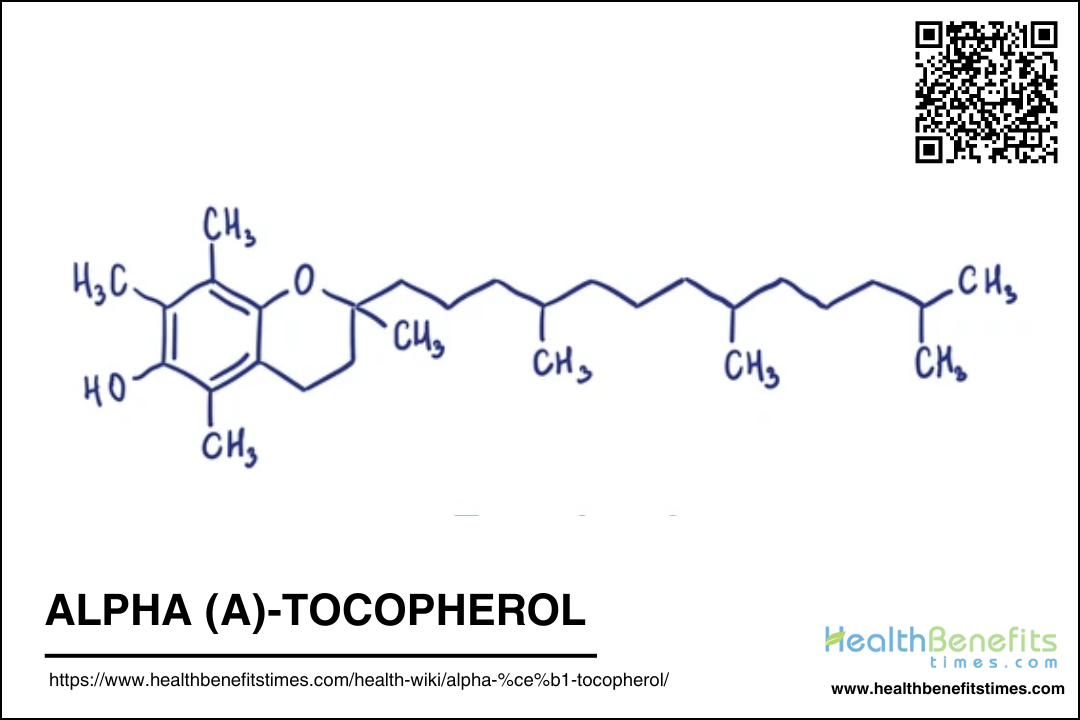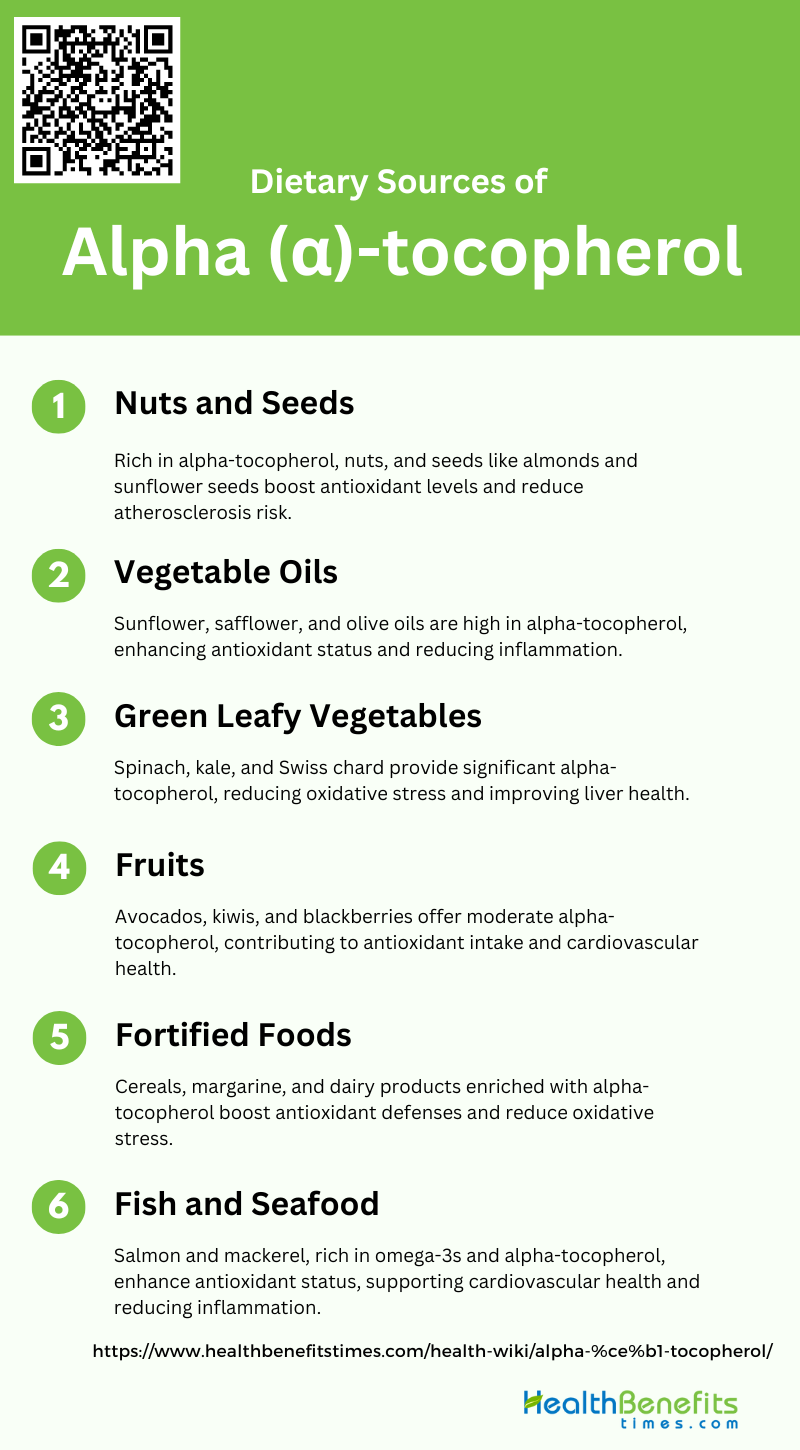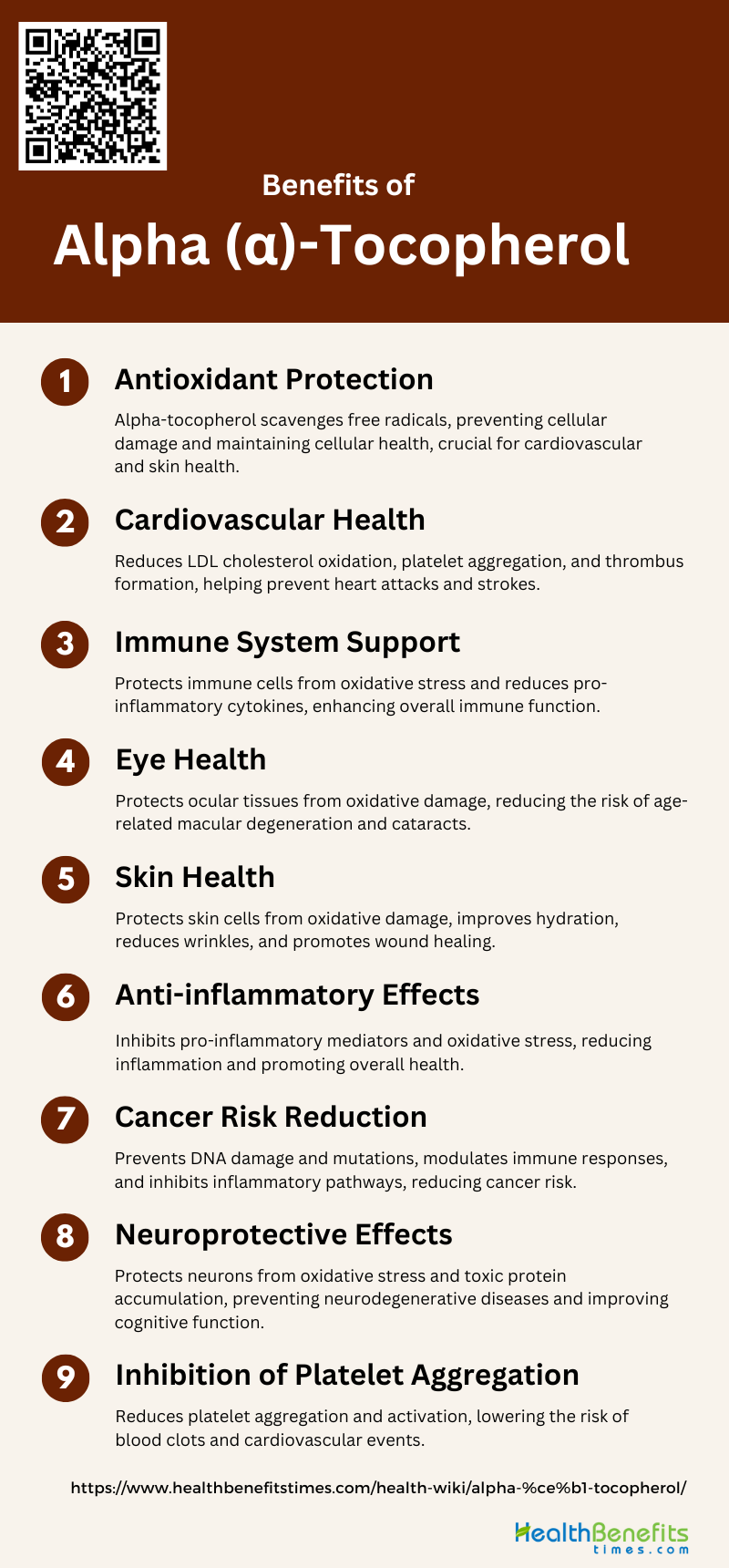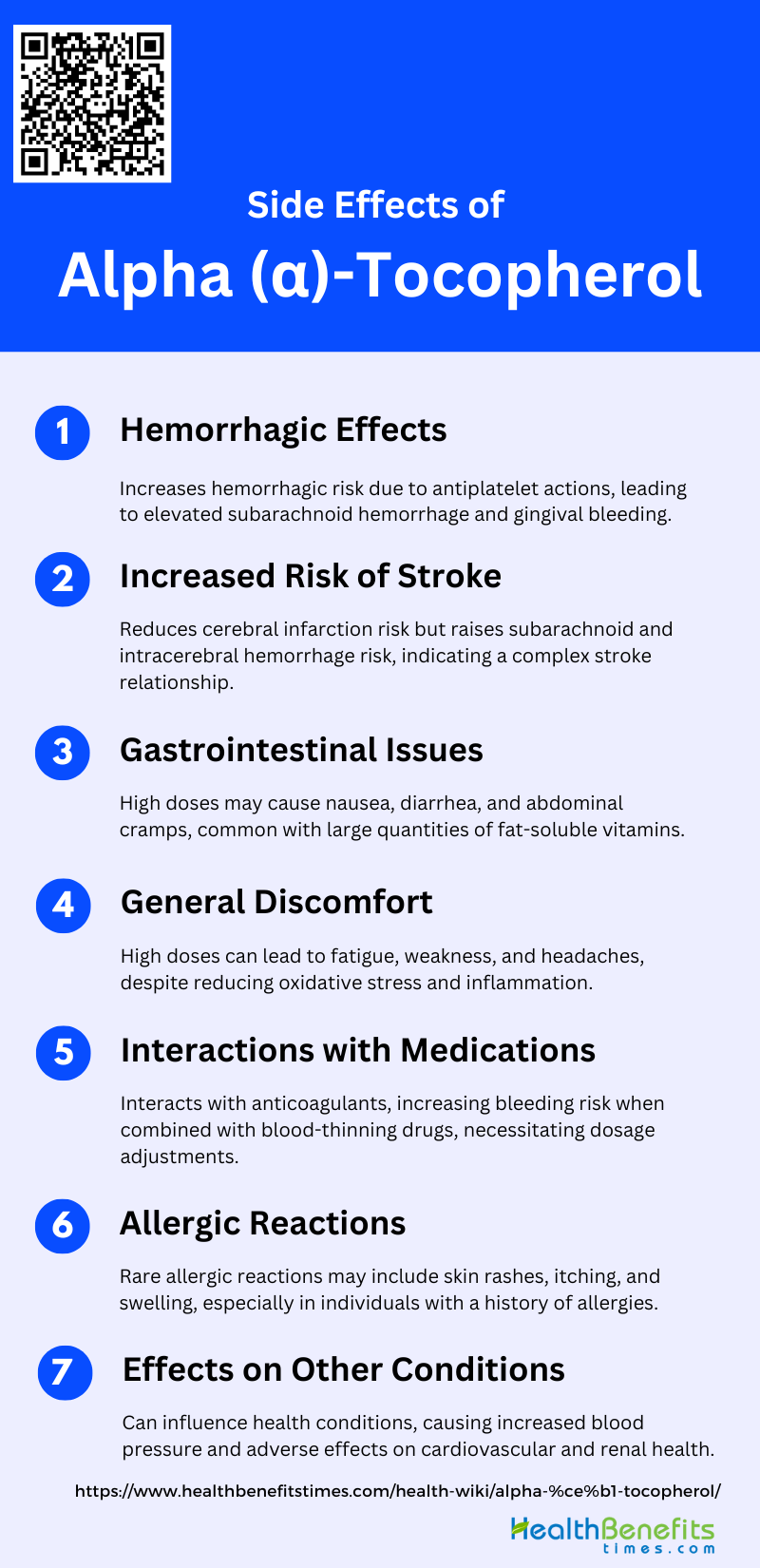 Alpha (α)-tocopherol is a form of vitamin E, a fat-soluble antioxidant that plays a crucial role in protecting cells from oxidative damage. It is one of the eight different isoforms of vitamin E, which include alpha-, beta-, delta-, and gamma-tocopherols, as well as their corresponding tocotrienols. Among these, α-tocopherol is considered the most biologically active and beneficial for human health. It is known for its ability to neutralize free radicals, thereby preventing lipid peroxidation and maintaining the integrity of cell membranes. α-Tocopherol is also involved in various physiological processes, including immune function and anti-inflammatory responses. It is commonly found in dietary sources such as nuts, seeds, and vegetable oils, and is often used in supplements to enhance its intake. Research has shown that α-tocopherol can mitigate the adverse effects of oxidative stress, support cardiovascular health, and potentially reduce the risk of certain chronic diseases.
Alpha (α)-tocopherol is a form of vitamin E, a fat-soluble antioxidant that plays a crucial role in protecting cells from oxidative damage. It is one of the eight different isoforms of vitamin E, which include alpha-, beta-, delta-, and gamma-tocopherols, as well as their corresponding tocotrienols. Among these, α-tocopherol is considered the most biologically active and beneficial for human health. It is known for its ability to neutralize free radicals, thereby preventing lipid peroxidation and maintaining the integrity of cell membranes. α-Tocopherol is also involved in various physiological processes, including immune function and anti-inflammatory responses. It is commonly found in dietary sources such as nuts, seeds, and vegetable oils, and is often used in supplements to enhance its intake. Research has shown that α-tocopherol can mitigate the adverse effects of oxidative stress, support cardiovascular health, and potentially reduce the risk of certain chronic diseases.
Properties of Alpha (α)-tocopherol
Here are some key properties of alpha (α)-tocopherol, the most biologically active form of vitamin E:
- Appearance: Slightly yellow to amber, nearly odorless, clear, viscous oil.
- Boiling Point: 235 °C.
- Melting Point: 3 °C.
- Solubility: Insoluble in water, soluble in ethanol and other aprotic solvents.
- Molecular Formula and Weight: C29H50O2 and 430.7 g/mol.
- Stability: α-Tocopherol is stable to heat and alkalies in the absence of oxygen but gradually darkens upon exposure to air or light due to oxidation.
Dietary Sources of Alpha (α)-tocopherol
It is essential for maintaining healthy skin, eyes, and immune function. It can be found in a variety of foods, making it accessible through a balanced diet. Here are some dietary sources rich in alpha (α)-tocopherol:
1. Nuts and Seeds
Nuts and seeds are excellent sources of alpha-tocopherol, a form of vitamin E. Almonds, sunflower seeds, and hazelnuts are particularly rich in this antioxidant. Consuming these foods can significantly increase alpha-tocopherol levels in the body, which has been shown to inhibit the oxidative modification of low-density lipoprotein (LDL), thereby potentially reducing the risk of atherosclerosis. Additionally, the high alpha-tocopherol content in nuts and seeds can contribute to overall better health by providing essential nutrients and promoting antioxidant activity.
2. Vegetable Oils
Vegetable oils, such as sunflower, safflower, and olive oil, are among the richest dietary sources of alpha-tocopherol. These oils not only enhance the flavor of foods but also provide a substantial amount of this vital antioxidant. Regular consumption of vegetable oils can lead to increased alpha-tocopherol levels in the body, which has been associated with reduced lipid peroxidation and improved antioxidant status. This can help in maintaining cellular integrity and reducing inflammation, thereby contributing to overall health and well-being.
3. Green Leafy Vegetables
Green leafy vegetables like spinach, kale, and Swiss chard are good sources of alpha-tocopherol. These vegetables are not only rich in vitamins and minerals but also provide significant amounts of this antioxidant. Including green leafy vegetables in the diet can help increase alpha-tocopherol levels, which has been shown to reduce oxidative stress and improve liver health by decreasing lipid content and inflammatory markers. This makes them an essential component of a balanced diet aimed at promoting long-term health.
4. Fruits
Certain fruits, such as avocados, kiwis, and blackberries, contain moderate amounts of alpha-tocopherol. While fruits are not the highest sources of this vitamin, they contribute to the overall intake of antioxidants in the diet. Regular consumption of these fruits can help maintain adequate alpha-tocopherol levels, which is important for protecting cells from oxidative damage and supporting cardiovascular health. The inclusion of fruits in the diet also provides additional nutrients and fiber, enhancing overall nutritional quality.
5. Fortified Foods
Fortified foods, including cereals, margarine, and dairy products, are often enriched with alpha-tocopherol to help meet dietary requirements. These foods are particularly beneficial for individuals who may not get enough vitamin E from natural sources. Consuming fortified foods can significantly boost alpha-tocopherol levels, which have been linked to improved antioxidant defenses and reduced markers of oxidative stress. This makes fortified foods a convenient and effective way to ensure adequate intake of this essential nutrient.
6. Fish and Seafood
Fish and seafood, such as salmon and mackerel, are not only rich in omega-3 fatty acids but also provide a good amount of alpha-tocopherol. Including these foods in the diet can enhance the antioxidant status and improve the nutritional quality of meals. Studies have shown that dietary alpha-tocopherol from fish can increase tissue vitamin E levels and reduce lipid peroxidation, thereby supporting cardiovascular health and reducing inflammation. This makes fish and seafood valuable components of a diet aimed at promoting overall health.
Benefits of Alpha (α)-Tocopherol
It, offers numerous health benefits, including antioxidant properties and immune system support. It plays a crucial role in protecting cells from oxidative damage and may help reduce the risk of chronic diseases. Here are some key benefits of alpha (α)-tocopherol:
1. Antioxidant Protection
It inhibits lipid peroxidation and reduces the production of reactive oxygen species (ROS) in various cell types, including monocytes and fibroblasts. This antioxidant activity is crucial in preventing cellular damage and maintaining cellular homeostasis, which is particularly important in the context of cardiovascular health and skin aging.
2. Cardiovascular Health
Alpha-tocopherol has been shown to have significant cardiovascular benefits. It reduces the oxidation of low-density lipoprotein (LDL) cholesterol, which is a key factor in the development of atherosclerosis. Additionally, alpha-tocopherol decreases platelet aggregation and delays thrombus formation, which can help prevent heart attacks and strokes. These effects are attributed to its antioxidant properties and its ability to modulate inflammatory responses.
3. Immune System Support
Alpha-tocopherol supports the immune system by protecting immune cells from oxidative stress and modulating inflammatory responses. It has been shown to prevent ultraviolet radiation-induced suppression of the skin immune system by inhibiting lipid peroxidation. Furthermore, alpha-tocopherol reduces the release of pro-inflammatory cytokines such as interleukin-1 beta (IL-1β) from activated monocytes, thereby enhancing immune function.
4. Eye Health
Its antioxidant properties help in reducing the risk of age-related macular degeneration and cataracts, which are major causes of vision loss in the elderly. By scavenging free radicals and reducing oxidative stress, alpha-tocopherol helps preserve the integrity of the eye’s cellular structures.
5. Skin Health
It protects skin cells from oxidative damage caused by environmental factors such as UV radiation and pollution. Alpha-tocopherol also improves skin hydration, reduces the appearance of fine lines and wrinkles, and promotes wound healing by enhancing cell viability and proliferation.
6. Anti-inflammatory Effects
Alpha-tocopherol exhibits significant anti-inflammatory effects by inhibiting the production of pro-inflammatory mediators. It reduces the release of superoxide anions and other reactive oxygen species from activated monocytes, thereby decreasing oxidative stress and inflammation. Additionally, alpha-tocopherol inhibits the activity of enzymes such as 5-lipoxygenase, which are involved in the inflammatory response.
7. Cancer Risk Reduction
This may help reduce the risk of certain cancers by protecting cells from oxidative damage and modulating immune responses. Its antioxidant properties prevent DNA damage and mutations that can lead to cancer development. Moreover, alpha-tocopherol’s ability to inhibit inflammatory pathways and enhance immune function may contribute to its potential anti-cancer effects.
8. Neuroprotective Effects
Alpha-tocopherol has neuroprotective effects that are beneficial in preventing neurodegenerative diseases such as Alzheimer’s and Parkinson’s. Its antioxidant properties help protect neurons from oxidative stress and reduce the accumulation of toxic proteins. Additionally, alpha-tocopherol modulates inflammatory responses in the brain, which can help prevent neuronal damage and improve cognitive function.
9. Inhibition of Platelet Aggregation
Alpha-tocopherol inhibits platelet aggregation, which is a crucial factor in preventing blood clots and cardiovascular events. It reduces platelet sensitivity to aggregation agents and inhibits the activation of protein kinase C (PKC), a key enzyme involved in platelet aggregation. This effect is significant in reducing the risk of coronary artery disease and other thrombotic conditions.
Side Effects of Alpha (α)-Tocopherol
While alpha (α)-tocopherol, is beneficial for health, excessive intake can lead to adverse effects. It’s important to be aware of these potential side effects to ensure safe consumption. Here are some common side effects of alpha (α)-tocopherol:
1. Hemorrhagic Effects
Studies have shown that alpha-tocopherol can elevate the risk of subarachnoid hemorrhage by 50% and fatal subarachnoid hemorrhage by 181%. This increased risk is likely due to the antiplatelet actions of alpha-tocopherol, which can inhibit platelet aggregation and thus increase bleeding tendencies. Additionally, alpha-tocopherol combined with acetylsalicylic acid (ASA) has been shown to significantly increase gingival bleeding, further indicating its potential to exacerbate hemorrhagic conditions.
2. Increased Risk of Stroke
While it has been shown to decrease the risk of cerebral infarction by 14%, it simultaneously increases the risk of subarachnoid hemorrhage and intracerebral hemorrhage. The post-trial follow-up of the Alpha-Tocopherol, Beta-Carotene Cancer Prevention Study indicated an elevated risk for cerebral infarction among those who had received alpha-tocopherol, suggesting a rebound effect after the cessation of supplementation.
3. Gastrointestinal Issues
Although the provided data does not directly address gastrointestinal issues, it is known that high doses of alpha-tocopherol can cause gastrointestinal discomfort, including nausea, diarrhea, and abdominal cramps. These side effects are common with many fat-soluble vitamins when taken in large quantities. The absence of direct evidence in the provided papers suggests that gastrointestinal issues may not have been a primary focus of these studies.
4. General Discomfort
General discomfort, including symptoms like fatigue, weakness, and headache, can occur with high doses of alpha-tocopherol. While the provided studies do not specifically mention these symptoms, they are commonly reported in clinical settings when patients are on high-dose vitamin E supplements. The overall safety profile of alpha-tocopherol in the studies suggests that while it can reduce oxidative stress and inflammation, it may also lead to general discomfort in some individuals.
5. Interactions with Medications
The combination of alpha-tocopherol with ASA has been shown to significantly increase the risk of gingival bleeding, indicating a potential for increased bleeding risk when combined with other blood-thinning medications. This interaction is crucial for patients on anticoagulant therapy, as it may necessitate dosage adjustments to avoid adverse effects.
6. Allergic Reactions
Allergic reactions to alpha-tocopherol are rare but possible. Symptoms can include skin rashes, itching, and swelling. The provided studies do not report specific instances of allergic reactions, but it is important to consider this potential side effect, especially in individuals with a history of allergies to vitamin E or related compounds.
7. Effects on Other Conditions
Alpha-tocopherol supplementation has been shown to influence other health conditions. For instance, it can increase blood pressure and cause adverse central nervous system effects in stroke-prone spontaneously hypertensive rats. Additionally, perinatal alpha-tocopherol overload can lead to alterations in kidney development and renal angiotensin II signaling pathways, resulting in elevated blood pressure later in life. These findings suggest that while alpha-tocopherol has antioxidant benefits, it can also have detrimental effects on cardiovascular and renal health under certain conditions.




